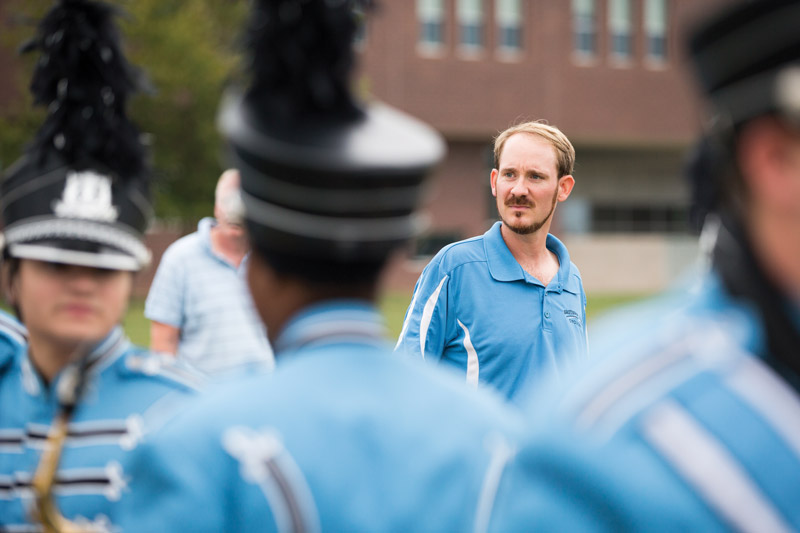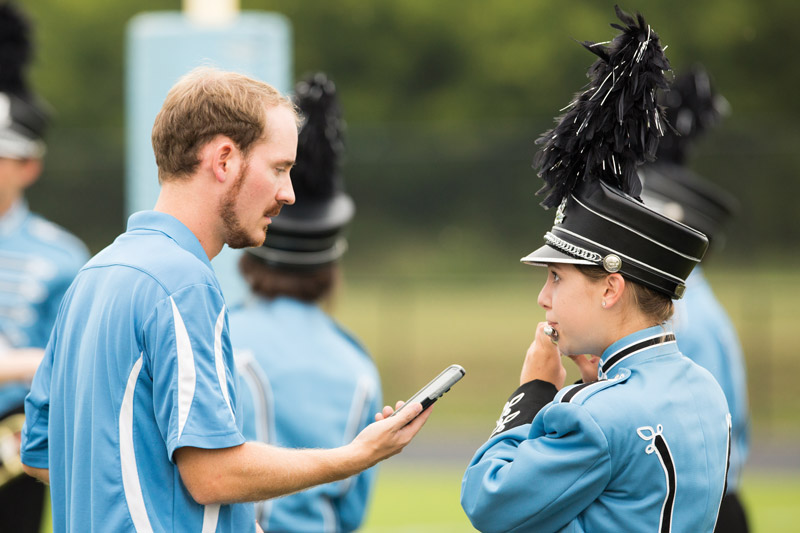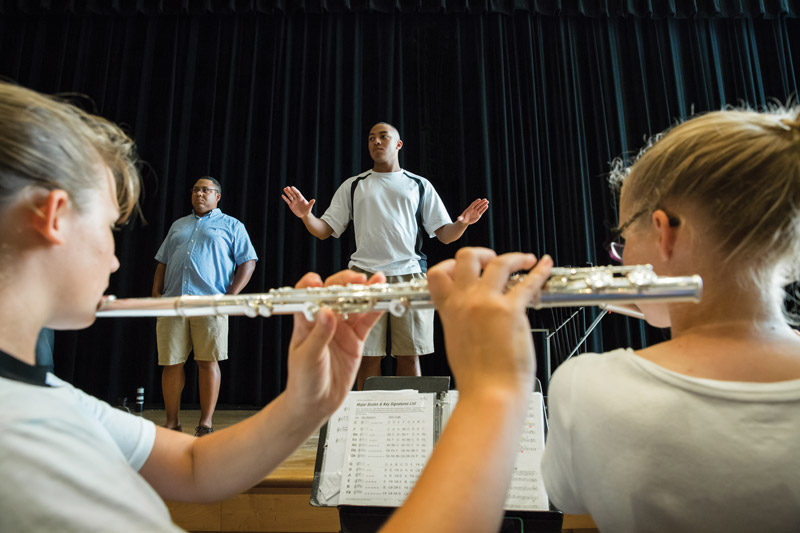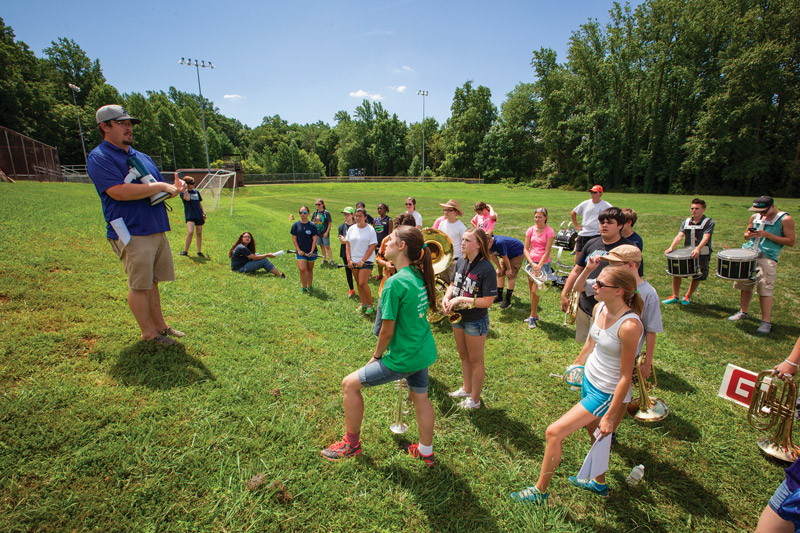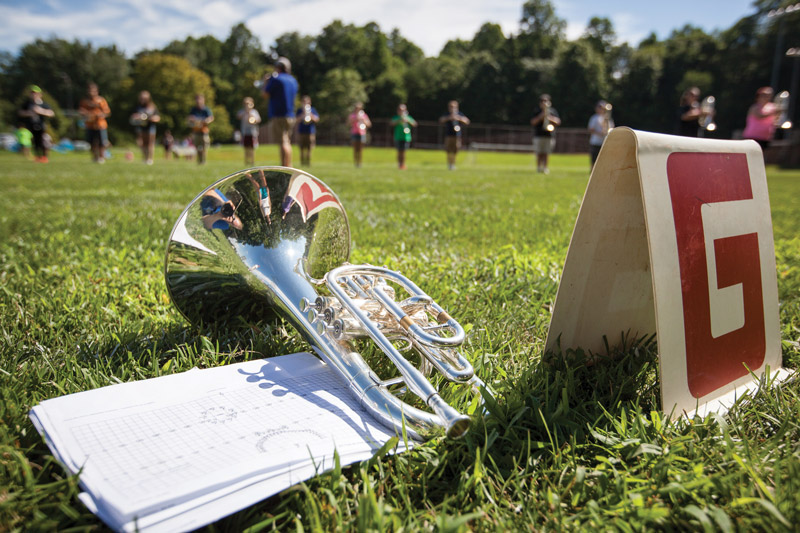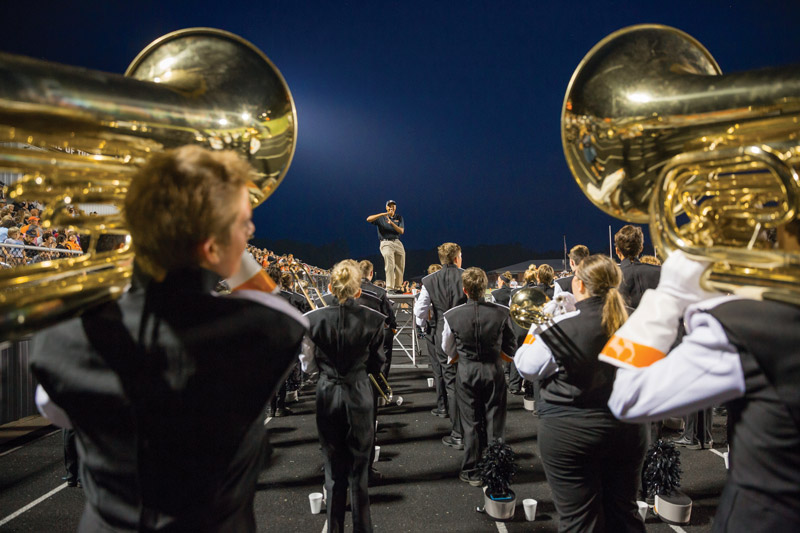It takes a special combination of hard-driving determination, charm and creativity to meld a bunch of teenagers into a finely tuned, music-making, marching machine.
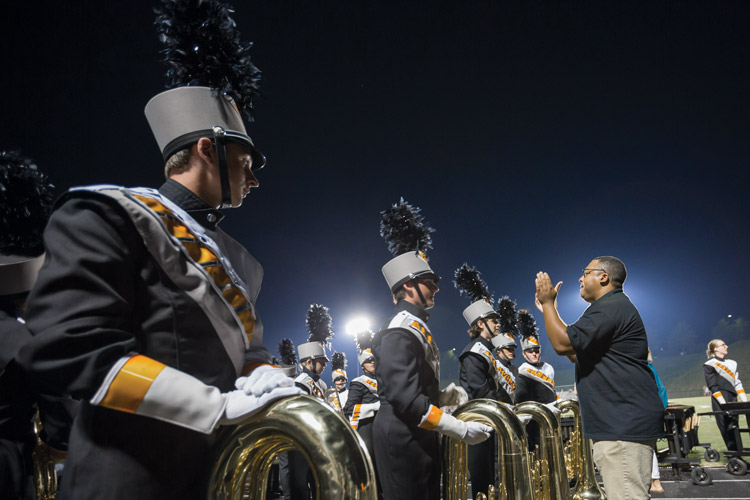
Andrew Snead ’11, assistant director of the Powhatan High School marching band, provides last-minute instruction to students before their halftime performance.
As the high-school marching band drilled on a football field one lazy, languid morning in July, few of their missteps escaped the band director’s attention.
It was the third day of band camp for the Marching Raiders of Appomattox County High School, and Bryan Allgood ’10, bullhorn in hand, was dispensing blunt corrections, gentle encouragement and irreverent one-liners from the sidelines.
“When do you win band competitions? This is when you win band competitions, guys,” he exhorted the 40 or so musicians and color guard members moving in formation across the field. “This is when you beat everyone else.”
Allgood loves everything about marching band—especially beating everyone else in band competitions—which has been an integral part of his life for as long as he can remember. He is one of several Longwood alumni who work as high-school band directors.
Whether the band has 40 members or 140, the year follows a familiar pattern for high school band directors like Allgood. It starts with summer band camp, which is part music rehearsal, part boot camp and part initiation rite for new members. In the fall, directors fret over the crispness of intricate, fast-paced halftime shows at Friday night football games and sweat out the results of Saturday band competitions. Come spring, their concert and jazz bands perform in concerts and festivals.

At Appomattox County High School’s band camp in June, band director Bryan Allgood ’10 delivers an up-close message to freshman mellophone player Brandon Bryant.
“Band directors are a different breed. Once you get bitten by the music bug, you can’t shake it,” said Adam Roach ’04, band director at Eastern View High School in Culpeper County.
They have to be able to play—not just teach—the numerous instruments that comprise a high-school band. That includes everything from a tiny piccolo to a giant sousaphone. They also have to deal with young people’s emotions, budgetary constraints for their band programs and the perception that band is an extracurricular (meaning unnecessary) activity. Yet, they all love their jobs and say they couldn’t imagine doing anything else.
“It’s a tremendous amount of work but fantastically rewarding. I’m having a whole lot of fun,” said Roach.
The marching band at Powhatan High School has a double Longwood connection. The director is Nick Snead ’12, and the assistant director is his brother, Andrew Snead ’11, who also is associate band director at Powhatan Junior High. This is the first year of their collaboration, and the brothers say it’s been a revelatory experience.
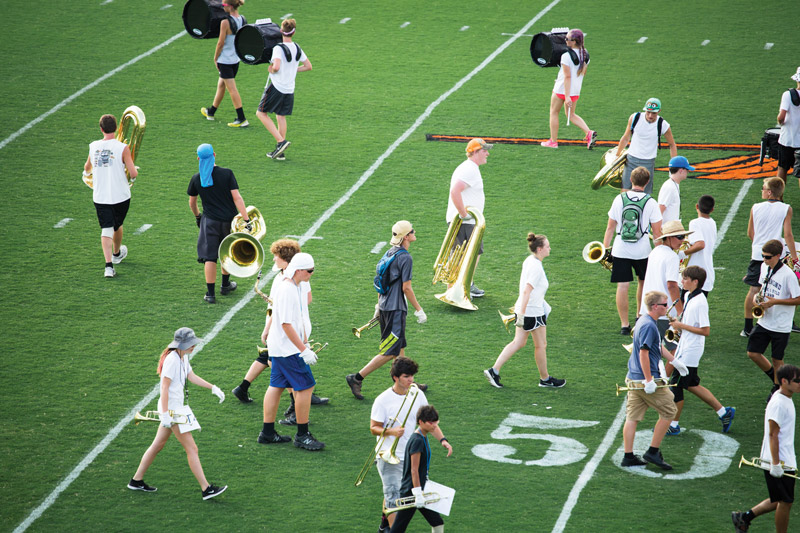
Despite the precision and polish that fans see at halftime shows, pre-game rehearsals, like this afternoon run-through at Powhatan High School, can appear more like chaos and confusion.
“Andrew is usually more the good cop, and I’m usually more the bad cop,” said Nick at this year’s first football game, “but sometimes that’s reversed.” Informed of his brother’s comment later that evening, Andrew smiled and said, I was the bad cop today, but, yes, I’m usually the good cop. Seriously, the collaboration is working well. I sometimes see things he doesn’t see, and vice versa.”
Nick also is band director at Pocahontas Middle School in Powhatan, where he starts work every day before heading to the high school. It’s not an uncommon job structure, and many directors like the continuity of teaching students from sixth grade through their senior year in high school.
“It’s neat that students begin their band experience with me and end it with me,” said Nick. There are many aspects to being a high-school band director, but, for many, there’s something irresistible about setting musicians in motion on the great, grassy expanse of a football field.
“My biggest passion is marching band. I’m always thinking about it,” said Allgood, whose father, Ricky Allgood, has been band director at Bluestone High School in Mecklenburg County for 39 years.
“From the time I was 6 months old, I was riding in my dad’s band bus. I was at his practices every day when I was 2 and started helping out when I was about 10. About 75 percent of what I know, I learned from him, but we’re different. He’s old school; I’m new school.”
Marching band requires commitment not only from the director but also from the students. In addition to band camp, which usually lasts at least two weeks and sometimes longer, marching bands typically rehearse several days a week after school, frequently until 6 or 6:30 p.m.
Kellie Harlow Knapp ’10 is band director at Tunstall High School in Pittsylvania County, where her marching band rehearses not only four afternoons a week but also on Saturdays. Saturday rehearsals are either from 10 to 2, or, if it’s been a bad week, from 9 to 5,” she said with the resolve of a drill sergeant. From 9 to 5? Yeah, we work hard,” said Knapp, whose high school band camp runs for four weeks. She is also band director at Tunstall Middle School.
Rob Blankenship ’00, band director at Douglas Freeman High School in Henrico County, starts his rehearsals at 7 a.m. on school days to have access to the football field the band shares with the football team.
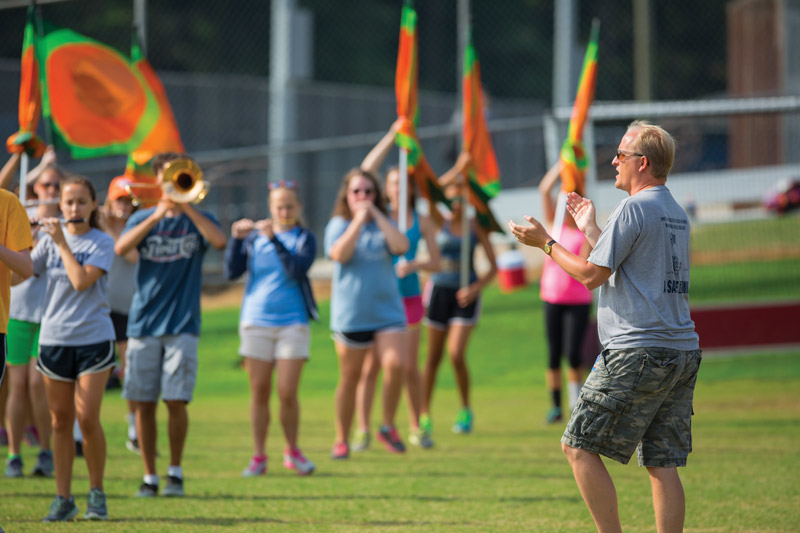
Rob Blankenship ’00 keeps time while his Douglas Freeman High School marching band prepares for the coming year at band camp in August.
Blankenship and Knapp, like Nick Snead, once played in the marching bands they now direct. “When I see teachers in the hallway that I once had, I tell them, ‘I can’t remember if I behaved for you,’” said Blankenship with a laugh.
The amount of preparation and physical effort required to execute a modern halftime show would probably surprise most of the crowd watching from the stands—even if they once participated in band. Shows are far more physically demanding than in the past due to increased movement, say the directors.
“The halftime show is only seven to eight minutes, but you’d be surprised at how long it takes to put together,” said Blankenship.
“Now they’re going backward about 100 miles an hour, so if one kid falls, 10 of them go down,” said Paul Dembowski ’89, a former high-school band director and currently department chair in a music magnet program at Broadneck High School in Annapolis, Md., his hometown. “The things we’re asking these kids to do wouldn’t have been dreamed of 15 years ago. The art form has evolved. There’s been a shift from supporting the football team to marching band for its own sake. Are the changes artistically sound and instructionally sound? I think so. The good band directors are interested in teaching the kids first.”
And then there are the hazards.
“If we go close to 10 minutes, which has happened, we have the football team running over top of us,” said Maurice Ellis ’09, band director at Central High School and Lunenburg Middle School in Lunenburg County.
And the mud-induced mishaps.
“We were rehearsing before a competition, and a girl was being lazy about marching and fell flat on her back in the mud,” said Allgood. Fortunately, she came up laughing, and then the whole band started laughing.”
For Blankenship, the story involves a halftime show. “On a muddy field one night, a baritone player walked right out of his shoes, but he kept on going and marched in his socks,” he said. “We had to retrieve them after the performance and before the football team went back out onto the field. I didn’t know he had lost his shoes until he told me he needed to go back on the field and get them.”
And the wardrobe malfunctions.
“I had someone slip and fall and rip her pants, but she got up and kept going,” said Derek Ramsey ’06, band director at Randolph- Henry High School and Central Middle School in Charlotte County. “You gotta keep going. She held it together through the show and was pretty upset when it was over.”
Johnathan Coward ’14, band director at Huguenot High School in Richmond, laughs now about something that was frustrating at the time. On the Tuesday before homecoming, a tuba player broke a valve on his instrument when it clipped a post as he walked through the double doors into the band room.
“Two days later, after we found another tuba in the back room, he snapped a valve on that one as he was coming in from practice,” said Coward. “I was running around the day of the game and was able to find another tuba at a local high school. After that, he was the most cautious band member I ever saw. He took his time going through doors, and the kids would tell him to watch out or give him exaggerated space.”
Competitions, usually about a half-dozen every fall, are a big part of the experience for marching bands and other high-school bands. “That’s the best part of marching band. That’s what I live for,” said Allgood, whose marching band competed on most Saturdays from Sept. 26-Oct. 31.
Even against his father’s band—especially against his father’s band—Allgood is intensely competitive.
“He doesn’t like to lose either,” he said. In a competition in Franklin County last October, we tied, with an identical score of 86.2, which I don’t think had ever happened before. He used to beat me all the time, but now we’re about split.”
For Danielle Minnick Neller ’11, band director at the high school and middle school in Buckingham County, the challenge has been rebuilding a band program that was dormant for years.
“There were no performing groups when I started, and every year we’ve added a performing group. I took a group of seven eighth graders to an instrumental competition in May at Kings Dominion, where they finished second among about 15 middle-school bands and got a Superior rating. We had only one student per instrument—it was like a solo all the time—and were competing against bands with 50 members.”
Neller also revved the marching band back up after a 15-year absence. The group performed its first halftime show at homecoming in September.
One challenge all band directors face is that their work will be judged on the performance of students who may have just flunked a test or broken up with their boyfriend. “A 16-year old can cuss you out one minute and be your best friend the next minute,” said Allgood. “You have to be a guidance counselor, a father figure and a friend. Sometimes you have to be critical; other times you have to pick them up. There are a lot of roles to play, which can be tricky. Kids are different these days.”
Regardless, many of the directors say that working with young people is the best part of their job.
“You feel good knowing that you’ve guided students; there’s nothing like it,” said Neller. And the students have achieved something, even if it’s small, which is wonderful. Watching them grow, not only musically but as people, is neat. We’re preparing them for the world.”
Blankenship, who composed the Longwood fight song, expressed the same feeling. “I love making music with these kids and challenging them. In 10 years, they’ve never disappointed me,” he said.
Several of the band directors give credit for their success to Dr. Gordon Ring, recently named Longwood’s first Simpson Distinguished Professor, and to Dr. Charlie Kinzer, professor and chair of music.
“Adam and I owe a lot of what we do to Dr. Ring and Dr. Kinzer,” said Rebecca Haluska Roach ’04, Adam’s wife and the band director at Culpeper Middle School. “We’ve stayed in touch with them. Dr. Ring did a clinic with bands at both of our schools in February.”
Kinzer and Ring played in marching bands in high school and as undergraduates (tenor saxophone for the former, trumpet for the latter). After getting his bachelor’s degree, Ring was a high-school band director for four years in his native Missouri.
Several of the band directors met their future spouses at Longwood. Rebecca and Adam Roach met as freshmen when Ring put together a brass ensemble to play at a ceremony. They were seated next to each other, both playing the trombone. “I leaned in to him and said, ‘Don’t listen to me. I suck.’ He leaned over and said, ‘Don’t worry. So do I,’” Rebecca said with a laugh.

Adam Roach ’04, band director at Eastern View High School in Culpeper County, was busy before the second football game in September. He had to repair the shako of freshman trombonist Everest Head, who was rehearsing with sophomore clarinetist Madison Tate (center) and senior piccolo player Daphne Sink.
Rebecca is among six alumni band directors at a middle school or junior high who, in addition to the high-school band directors, were interviewed for this story. Also interviewed was another alum who directs a middle school-level band at her K-12 school.
At Allgood’s band camp, he turned philosophical when gathering the band just before lunch. “Doing band won’t give you immediate intrinsic rewards, but the life skills you get from working with 60 people—five of whom you don’t like, which is what you’ll find in the workplace—are invaluable,” he said.
The musical tradition in the Allgood family— Allgood is married to Allison Warren Allgood ’09, a Longwood staff member—will continue with daughter Abigail Joy, whose first birthday is Dec. 22. “She’s already had a trumpet to her lips. She’s gonna play trumpet,” he said. “I always loved trumpet. That was my dad’s instrument; he taught me to play. That was the instrument that got the girls.”
Will Abigail be in marching band? “There won’t be a choice,” he said with a smile.
—Kent Booty

